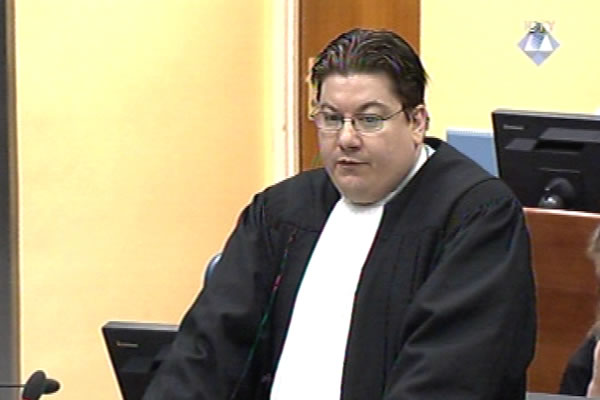Home
A SEARCH OF A BETTER LIFE, NOT GENOCIDE
The army headed by the accused Ratko Mladic did not ethnically cleanse large swathes of BH territory, defense counsel Dragan Ivetic argued as the defense continued presenting their closing arguments. Ivetic also contested the allegation that in Prijedor and some other municipalities the troops under Mladic’s command had committed genocide. Non-Serbs didn’t leave their homes under pressure and violence but because ‘there was no electricity, medicines, water and food’. They left in search of a better life, Ivetic told the court
 Dragan Ivetic, defence attorney of Ratko Mladic
Dragan Ivetic, defence attorney of Ratko Mladic On Friday, the first day of the defense’s closing arguments, defense lawyers Branko Lukic and Dragan Ivetic contested in very broad terms the prosecution case on Ratko Mladic’s responsibility on all counts in the indictment, concluding with a call for their client’s acquittal. Today, as they continued presenting their closing arguments,Ivetic analyzed in greater detail the prosecution’s evidence on genocide in several municipalities, particularly in Prijedor, and on the so-called ‘comprehensive’ joint criminal enterprise.
The prosecution, Ivetic noted, uses Prijedor, its prison camps and Tomasica mass graves as a ‘model’ of genocide in the municipalities. As alleged in the indictment, the ethnic cleansing reached the scale of genocide not only in Prijedor but alsoin Kljuc, Sanski Most, Kotor Varos, Vlasenica and Foca.
The defense claims that there wasno genocide, either in Prijedor or in other municipalities. The residents of Prijedor and the neighboring non-Serb villages left their homes because ‘there was no electricity, medicines, water and food’. They left in search of a better life, not because of the pressure and violence of the Serb forces. In Ivetic’s words, people ‘go where it is better for them’.
Ivetic went on to note that the prosecution had failed to show any orders in which Mladic ordered his troops to commit genocide. Also, Ivetic stressed, the prosecution wasn’t able to prove Mladic’s intent to ‘destroy as such’ parts of ethnic and religious groups. Invoking the fact that there had been many Muslims and Croats in the VRS ranks, Ivetic asked whether ‘those soldiers and officers participated in genocide against themselves and their families’.
Ivetic alleged that the police was responsible for the Prijedor prison camps; more specifically, he blamed it all on the Prijedor police chief Simo Drljaca. Mladic was not on good terms with Drljaca. Although the defense contests the authenticity of Mladic’s war diaries, today his lawyers quoted from them. According to the war diary, Mladic refused Drljaca’s request to send the army to help remove about 5,000 bodies of Muslims buried in Tomasica by ‘burning or grinding them or in any other way’. ‘You killed them, you get rid of them’, Mladic told Drljaca. According to Ivetic, the accused thus clearly showed his ‘animosity and resentment towards Drljaca’.
Contradicting the prosecution’s allegation that the military machinery had been used to dig the Tomasica mass grave, Ivetic argued that the army had nothing to do with that. The military machinery was put to use at a different location, and the Prijedor MUP personnel removed the bodies, Ivetic explained.
Today, Ivetic repeated the claim already presented in the defense’s final brief which was interpreted by the prosecution last week as an attempt to shift blame from Mladic to his subordinate Corps commanders. Krstic, Galic and Milosevic, three Corps commanders, have all been sentenced to length imprisonment for crimes in Srebrenica and Sarajevo. Today Ivetic stressed that Mladic ‘issued orders at a strategic level, and the Corps commanders decided how their subordinates would implement them tactically’. Mladic’s ‘power was not absolute and he was constrained by the VRS principles and structure’, Ivetic added.
The defense continues its closing arguments tomorrow.
Linked Reports
- Case : Mladic
- 2016-12-09 MLADIC’S DEFENSE: PROSECUTION FAILED TO MEET BURDEN OF PROOF
- 2016-12-07 PROSECUTOR CALLS FOR LIFE SENTENCE FOR RATKO MLADIC
- 2016-12-06 FROM ETHNIC CLEANSING TO GENOCIDE
- 2016-12-13 DEFENSE: ACQUIT MLADIC OR SENTENCE HIM TO NO MORE THAN 5 TO 15 YEARS IN PRISON
- 2016-12-15 LAST TRIBUNAL TRIAL ENDS
- 2017-02-28 MLADIC’S MOTION ALLEGING UNFAIR TRIAL REJECTED
